| Other Prominent Englishmen |
| |
| |
| Lot |
Photo |
Description |
Lot 1123 |
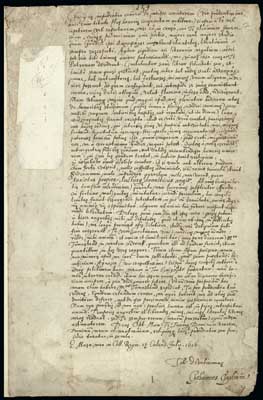 |
Goodwin, John (1594-1665), English Puritan cleric and religious writer. Autograph Letter Signed "Johannes Goodwin", one page (with integral address leaf), 7½ x 12, Queen's College, July 13, 1619. To Sir H. "Spelman Knight at his house in Smithfield in London", soliciting his intervention for redress of a literary grievance. Some aging and restoration including the two pages reinforced.
Estimate 500 - 750
Among John Goodwin's writings was "Defence of the Sentence Passed Upon King Charles I". During the Civil War, he originally sided with the Republicans, later switching his support to the army. He was briefly jailed following the restoration of the King in 1660.
View details and enlarged photo
|
Lot 1124 |
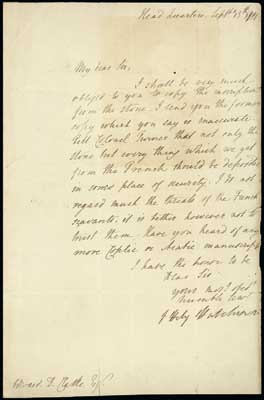 |
Hely-Hutchinson, John, 2nd Earl of Donoughmore (1757-1832), Manuscript Letter Signed as Commander of the 1801 Expedition to Egypt, one page, 8 x 12¼ "Head Quarters", September 13, 1801. To Edward D. Clarke referring to seizure of the Rosetta Stone from the French in Alexandria:
"I shall be very much obliged to you to copy the inscription from the stone. I send you the former copy which you say is inaccurate. Tell Colonel Turner that not only the stone but everything which we get from the French should be deposited in some place of security. I do not regard much the threats of the French savants, it is better however not to trust them. Have you heard of any more Coptic or Arabic manuscripts."
Some splitting along folds and sealed tears, paper inlay in left margin. Fine.
Estimate 1,000 - 1,500
FASCINATING DETAILS SHEDDING LIGHT ON THE BRITISH ACQUISITION OF THE FAMOUS ROSETTA STONE WHICH NOW RESIDES IN THE BRITISH MUSEUM.
Hely-Hutchinson took over command from Sir Ralph Abercromby, who died as a result of wounds at the second Battle of Abukir in March, 1801. French scholars carried the Rosetta Stone from Cairo to Alexandria under the escort of the retreating troops of de Menou. Hely-Hutchinson made seizure of the Rosetta Stone a precondition of the relief of Alexandria, which led to the French surrender. Edward Daniel Clarke was one of two British scholars sent to Egypt to check the French collection of historical artifacts, while Colonel Tomkyns Helgrove Turner brought the Rosetta Stone back to Britain. There are conflicting stories as to which one of these two persons was responsible for actually procuring the stone from the French.
View details and enlarged photo
|
Lot 1125 |
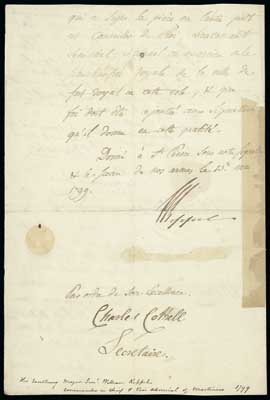 |
Keppel, Major General William (d.1834), British military leader. Manuscript Document Signed as Commander in Chief and Interim Governor of Martinique, four pages, 7¾ x 11½ St. Pierre, May 15, 1799, a little reduced at top, otherwise Fine.
Estimate 200 - 300
The British occupied Martinique from 1794-1802.
View details and enlarged photo
|
Lot 1126 |
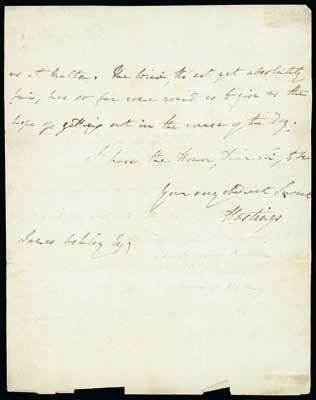 |
Rawdon-Hasting, Francis, 1st Marquess of Hastings, Earl of Moira (1754-1826), British military leader, Governor-General of India (1813-1823), purchased the island of Singapore (1819), Governor of Malta (1824-1826). Autograph Letter Signed, two pages, 7¼ x 9¼ Spithead, July 23, 1826. To James Ashley concerning payment for posting of letters and parcels, as well as items forwarded to him in Malta (where he retired), aging and edge faults at bottom. Very Good.
Estimate 200 - 300
Rawdon-Hastings had a distinguished military career, serving in the American Revolutionary War from 1775-1782. He is believed to have been the youngest British officer at Bunker Hill. His shining moment in America was his victory at Hobrick's Hill, where his Irish Volunteers, the military corps he organized, defeated a superior size American force.
View details and enlarged photo
|
Lot 1127 |
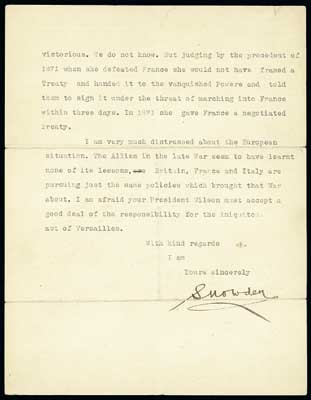 |
Snowden, Philip, 1st Viscount of Snowden (1864-1937), British Chancellor of the Exchequer, 1924, 1929-31, Lord Privy Seal, 1931-1932. Typed Letter Signed "Snowden" on "Rt. Hon. Viscount Snowden" letterhead, one page (both sides), 7 x 9, Farnham, Surrey, May 1, 1935. To Howard W. Bible, Washington, D.C. A scathing indictment of the Treaty of Versailles, clearly laying much of the blame on Woodrow Wilson.
"Recent happenings in the relations of Germany and the Allies in the War have brought the questions of the revision of the Versailles Treaty into great prominence. The victorious Powers having for fifteen years refused to implement their obligations in respect of a general reduction of armaments. Germany has now taken the matter into her own hands.
My own views on the question remain what they were. The Treaty was a vindictive and immoral act and was full of the seeds of future wars. Ever since it was imposed by force it has kept Europe in a state of unsettlement.
I do not think it is much use now discussing what Germany would have done if she had been victorious. We do not know. But judging by the precedent of 1871 when she defeated France she would not have framed a Treaty and handed it to the vanquished Powers and told them to sign it under the threat of marching into France within three days. In 1871 she gave France a negotiated Treaty.
I am very much distressed about the European situation. The Allies in the late War seem to have learnt none of its lessons. Britain, France and Italy are pursuing just the same policies which brought that War about. I am afraid your President Wilson must accept a good deal of the responsibility for the iniquitous act of Versailles."
Some creases split at edges, overall Fine.
Estimate 500 - 750
Best remembered for having taken Britain off the Gold Standard in 1931, Snowden made an economic volte-face in 1935 by supporting Lloyd-George's radical economic platform in the General Election.
View details and enlarged photo
|
|